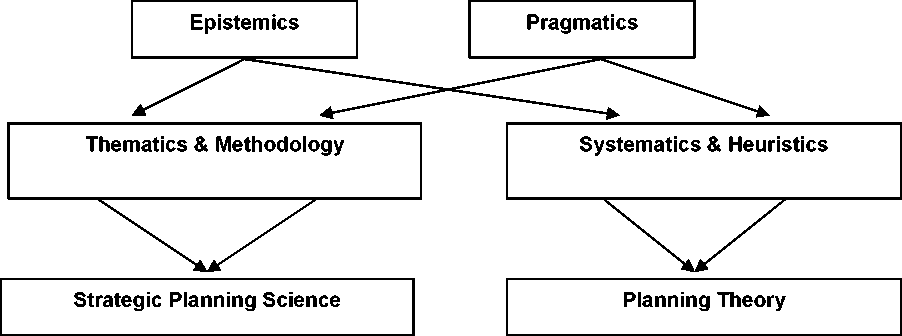Problems


Institutional arrangements, as do applied professional practices, are activated in
accordance with the need to eliminate internal frictions and external tensions, wherefore
strategic planning gets attributes that are most often expressed as: knowledge-based,
intention-guided, law-based and reason-controlled process.
Strategic planning as such is based on reliability of findings, possible perspectives and
competent estimations, which, as approach, can be expressed with epistemic and
pragmatic knowledge. Thereby, episteme and pragmatics in strategic planning are by
no means pure derivates of strategic planning science and planning theory, but rather
represent the results of ample interrelated strategic planning practices. This goes side
by side with experience in the professional implementation of certain scientific
postulates which in this process, as a rule, influence recombination in the most varied
contexts. The objective is to effectuate an objective approach in the elaboration of
relevant proposals on the basis of valid/acceptable rules/propositions.
Model of Local Strategic Planning in Serbia
Local strategic action planning has to be methodologically well-grounded so as to be
able to answer the following important questions:
Why is strategic planning so important?
Successful and efficient development of local communities is not possible in the
absence of an overall process of strategic management including planning,
implementation and evaluation of accomplished effects. This is of equal importance for
municipalities with abundant funds as for those with insufficient funds. Whatever the
More intriguing information
1. THE CHANGING STRUCTURE OF AGRICULTURE2. Short- and long-term experience in pulmonary vein segmental ostial ablation for paroxysmal atrial fibrillation*
3. National urban policy responses in the European Union: Towards a European urban policy?
4. Critical Race Theory and Education: Racism and antiracism in educational theory and praxis David Gillborn*
5. Shifting Identities and Blurring Boundaries: The Emergence of Third Space Professionals in UK Higher Education
6. TRADE NEGOTIATIONS AND THE FUTURE OF AMERICAN AGRICULTURE
7. Picture recognition in animals and humans
8. Insurance within the firm
9. FDI Implications of Recent European Court of Justice Decision on Corporation Tax Matters
10. CGE modelling of the resources boom in Indonesia and Australia using TERM